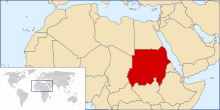Sudanese cuisine


Sudanese cuisine is varied by region, and greatly affected by the cross-cultural influences in Sudan throughout history.
Appetizers
Meals include elmaraara and umfitit, which are made from sheep's offal (including the lungs, liver, and stomach), onions, peanut butter, and salt. They are eaten raw.[1]
Alcoholic beverages
Historically, Sudan was one of the few predominantly Muslim countries that allowed alcohol. Men drank millet wine, sharbot (an alcoholic drink from fermented dates) and araqi. As the 20th century came, they were influenced by Europeans, and began drinking whiskey and beer. Since the late 1980s when Sudan sharia was implemented, alcohol has been banned. The law bans the purveying, consumption, and purchasing of alcohol. Being lashed 40 times is the penalty for breaking the prohibition on alcohol.[2] Former Sudanese President Gaafar Nimeiry enacted sharia in September 1983, marking the occasion by dumping alcohol into the Nile river.[3] Araqi is an alcoholic gin made from dates, which is illegally brewed in defiance of sharia.[2] Araqi brewers in Sudan continue production despite sharia.[2]
Cheeses
- Gibna Bayda (white cheese)[4]
Soups and stews
Several stews, including, Waika, Bussaara, and Sabaroag use Ni'aimiya (Sudanese spice mix) and dried okra. Miris is a stew made from sheep's fat, onions, and dried okra. Abiyad is made from dried meat, while Kajaik is made from dried fish.[1]. In Equatoria,
Sudanese soups include Kawari, made from cattle or sheep hooves with vegetables, and Elmussalammiya, made from liver, flour, dates, and spices.[1]
See also
References
- ^ a b c Sudanese Food, Embassy of the Republic of the Sudan, Washington, DC
- ^ a b c Fleming, Lucy (April 29, 2010). "Sudan's date-gin brewers thrive despite Sharia". BBC News. Retrieved July 7, 2016.
- ^ iPad iPhone Android TIME TV Populist The Page (1984-01-23). "Sudan: Hearts, Minds and Helicopters". TIME. Retrieved 2013-03-15.
- ^ Gibna Bayda (white cheese)
Further reading
- Susannah Wright. Sudan (Ebiz Guides). MTH Multimedia S.L., 2005. ISBN 84-933978-4-9, ISBN 978-84-933978-4-5. Pg 203-205.
